By Joanne Liou, Communications and Impact Specialist
When most of us think of diplomacy, images of long tables with microphones at the UN or intense closed-door meetings may come to mind, but multifaceted exchange programs, such as TechWomen, provide a powerful path for citizen diplomacy. Launched in 2011, TechWomen offers a disruptive approach to diplomacy by offering mentorship to hundreds of women from Algeria and Cameroon to Uzbekistan, among other developing countries, at innovative companies and nonprofits based in the Bay Area and Silicon Valley.
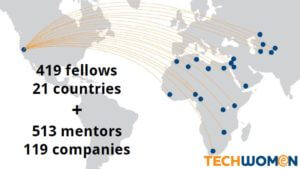 Last month, at South by Southwest in Austin, Texas, TechWomen Director Arezoo Riahi and mentors Claudia Galvan and Lucie Newcomb participated in a panel session moderated by fellow TechWomen mentor Tina Shakour. The session focused on the power of TechWomen and exchange programs as disruptive diplomacy. Since 2011, nearly 1,000 participants from more than 20 countries have been united by their passion for science, technology, engineering and math (STEM) and mission to make an impact on their communities.
Last month, at South by Southwest in Austin, Texas, TechWomen Director Arezoo Riahi and mentors Claudia Galvan and Lucie Newcomb participated in a panel session moderated by fellow TechWomen mentor Tina Shakour. The session focused on the power of TechWomen and exchange programs as disruptive diplomacy. Since 2011, nearly 1,000 participants from more than 20 countries have been united by their passion for science, technology, engineering and math (STEM) and mission to make an impact on their communities.
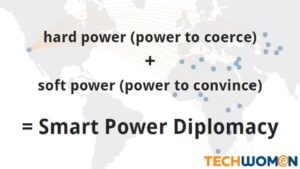 “We specifically target women professionals in the STEM fields because of the potential women have in these fields to realize greater economic success and equality,” Arezoo said. “The TechWomen program is a form of smart power diplomacy. Smart Power is the combination of hard power and soft power in pragmatic ways.”
“We specifically target women professionals in the STEM fields because of the potential women have in these fields to realize greater economic success and equality,” Arezoo said. “The TechWomen program is a form of smart power diplomacy. Smart Power is the combination of hard power and soft power in pragmatic ways.”
TechWomen brings people together for greater understanding and to empower women around the world through science and technology. “When women do better, countries do better. Global prosperity, security and stability cannot be achieved without the full participation of women,” Arezoo stated.
How is a mentoring program for women related to global diplomacy?
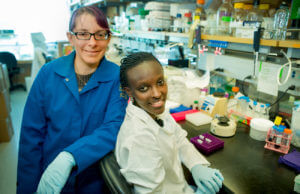
Emily Crawford, a biochemist at the University of California in San Francisco, hosted Alida Ngwije, a lab coordinator from Rwanda in September 2016. Alida’s focus was on infectious diseases, including malaria. Alida had a chance to meet other malaria researchers while working on a project to sequence the genomes of malaria parasites. In turn, Emily and her team had the opportunity to hear Alida’s perspectives on the science and medicine of malaria.
Diplomacy starts with people, and it is a two-way street. “Anyone can be a diplomat,” Lucie explained. “In fact, we seem to have entered an era where we almost have to be.”
Citizen diplomacy is about building bridges, making connections, cultivating relationships and opening doors, Lucie continued. “It’s not about making everyone your best friend forever, but it is about showing respect and civility for everyone, even when it may not be mutual. As such, it may be appropriate to step back sometimes, and let folks be where they are. Diplomacy is a contact sport, but sometimes it’s also a dance.”
With a focus on women in male-dominated fields, TechWomen is disrupting and helping to shift the status quo for generations to come. Through the mentorship and everyday interactions, women in STEM are serving as “ambassadors” for their communities and cultures. “It is connecting with and touching the lives of individuals on both sides of the exchange,” Tina added. “We learn new things about our own world and the world around us, and we share those experiences. It’s a ripple effect, of sorts, and takes time to fully see the impact.”
By engaging with women, in particular, TechWomen highlights a population that is often marginalized, and there’s a common thread among many countries where females have limited access to education and opportunities to advance their careers. “Through this program, I learned that there are a lot of women leaders in countries in the Middle East and Africa that do not have professional support systems to amplify their impact,” Claudia said. “Empowering women in these countries provides opportunities for them to have local impact across the board.”
How does TechWomen work?
For five weeks, selected participants work with mentors – women and men leaders from leading tech companies, like Google, Tesla and NASA. For the 2017 program, TechWomen received nearly 4,000 applicants, of which 100 women will be selected and sponsored to come to the U.S. “They live and experience the innovative ideas, technologies and culture of San Francisco and Silicon Valley,” Arezoo explained. “But even more importantly, they meet positive role models and other women leaders. Those five weeks are just the beginning.”
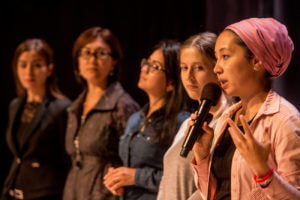
The 2016 Uzbekistan cohort pitch their action plan at TechWomen Pitch Day on Oct. 7, 2016, at Oracle in Redwood City, Calif. The women developed a plan to support recent female graduates gain employment.
In addition to the mentorship, TechWomen organizes a series of workshops to identify community challenges and sustainable solutions that can be implemented when participants return home. In the company of their fellow women leaders in the STEM fields, country cohorts develop an action plan to address social and economic issues in their communities. “They leverage their newfound skills and networks to launch initiatives, such as solar-powered computer labs in Kenya and curriculum to teach kids as young as eight how to code in the Middle East,” Arezoo said. The country cohorts pitch their ideas before a panel of judges comprising of venture capitalists and industry leaders, and the top action plans are awarded seed grants to support implementation. Read more about the 2016 action plans and seed grant winners.
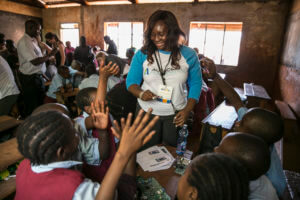
Queen Denchukwu, who has mentored with TechWomen since 2014 at Autodesk, leads a motherboard workshop during the TechWomen delegation in Kenya in February 2017.
Another element of the program are the delegation trips. “The program comes full circle when the mentors from Silicon Valley visit past participants on delegation trips to reinforce and grow our network,” Arezoo said. The annual delegation trips provide a platform to support alumnae in making an impact in their communities, while exposing young girls and women to STEM. Earlier this year, delegates visited Kenya and Kyrgyzstan, reaching more than 3,250 students and professionals through workshops and meetings. The trips also provide an opportunity for mentors to experience and learn first-hand about their mentees’ working environment and cultures.

From left, Tina Shakour of Red Bird Marketing, Arezoo Riahi of IIE/TechWomen, Lucie Newcomb of The NewComm Global Group and Claudia Galvan of Early Stage Innovation hosted a panel session on the power of exchange programs and citizen diplomacy at South by SXSW in Austin, Texas, on March 13, 2017.
“I was stunned when we went to Rwanda (in 2014) to find that over 60% of their parliament is female, while our congress hovers around 20% female,” Tina said. “They are first in the world, while we are 104th. While Rwanda still has some cultural issues around women in leadership and STEM, they made a massive cultural shift after the genocide to address the role of women in their society. As Americans, we like to think we have it all figured out, but we truly can learn from others.”


Speak Your Mind